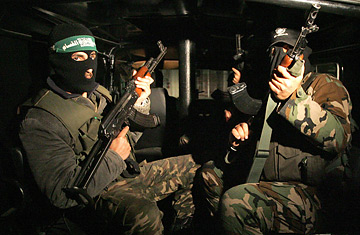
Hamas gunman, deployed near the border with Israel, April 26, 2007
The Palestinians clearly intended to put a damper on the Israeli party mood. Nobody was hurt in the barrage, but the echo of this rocket attack is still resounding. This was the end of an on-again, off-again cease-fire between Israel and radicals within Hamas, the Islamic militant group that is partners in a coalition government with President Mahmoud Abbas's Fatah movement. An armed wing of Hamas said it launched the rocket attacks in retaliation for the killing of nine Palestinians, including a young girl, during Israeli military operations several days ago in the West Bank towns of Nablus and Jenin. It isn't clear yet whether the decision by those armed Hamas militants to tear up the cease-fire was approved by Palestinian Prime Minister Ismael Haniyeh, who belongs to Hamas.
It is unlikely because Haniyeh may be losing his grip on the militant fighters of his own organization. Izzeddine al-Qassam Brigades, a hard-line group within Hamas, is furious with Haniyeh for striking a power-sharing deal with Abbas, who is commited to U.S.-sponsored peace talks with Israel. As one Palestinian official mused in Gaza, "Breaking the cease-fire has more to do with Palestinians versus Palestinians than fighting the Israelis."
Unsurprisingly, the Israelis don't see it that way. Prime Minister Ehud Olmert on Wednesday vowed that the army would carry out "pin-point" operations using helicopter gunships to halt the rockets pouring out of Gaza. He ruled out a larger assault on the Palestinian enclave in Gaza, according to several military sources, because aside from causing more damage to civilian Palestinian homes, it is doubtful that a big offensive could stop the rocket crews. A drawn-out siege in Gaza last summer, sparked by the capture of an Israeli corporal, killed hundreds of Palestinians but failed to halt the barrage of short-range and often wildly inaccurate missiles careening into southern Israel.
Olmert is already in a political muddle, and another potentially inconclusive assault in Gaza won't help. A major ground offensive at this moment would not help the Israeli Prime Minister's fortunes. Olmert will need to focus all of his boisterous charm next week just to keep his government from crumbling. Additionally, an inquiry into Israel's messy summer 2006 war in Lebanon is due out on Monday, and it is expected to lambaste Olmert and his novice Defense Minister Amir Peretz. Furthermore, the danger exists that militants could retaliate by executing the captive Israeli soldier.
Another nightmare awaits Olmert. The State Comptroller's office says it may launch a criminal investigation into his past financial dealings. All in all, it's a bad time for Olmert to start a major offensive against Gaza, and nobody knows this better than the Palestinian militants who are firing the rockets. With reporting by Jamil Hamad/Bethlehem and Aaron J. Klein/Jerusalem
